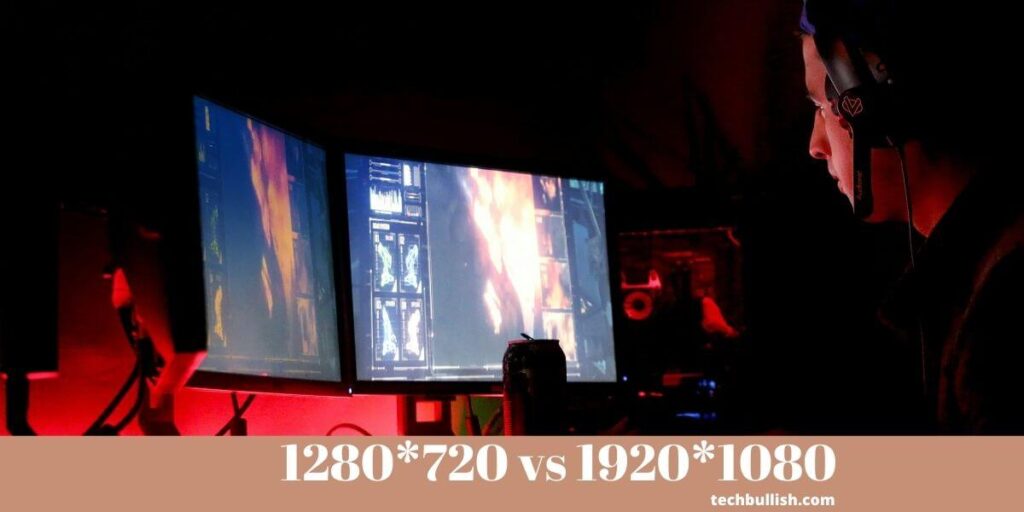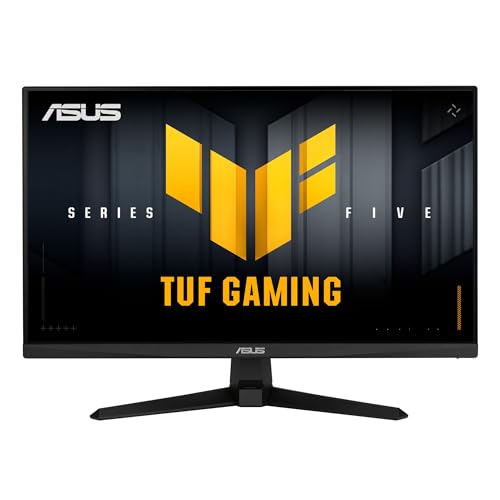There are different resolutions on computer monitors and TV screens like 720p, 1080p, 4k, etc.
The immersive experience that we get from the visual display, either a monitor or a TV, is prominent because of the depth of resolution and pixel depth.
Five years before, I used a computer monitor with HD resolution, i.e., 1280×720. However, that 720p monitor was only 18.5 inches. With time, we now use more 1080p monitors and even 1080p TVs.
So, the HD resolution seems outdated, and the display does not feel crisp enough after seeing a Full HD (1920*1080) resolution.
Why Should you Trust Me? Hi, I am Anirban Saha, an Engineer with a Specialization in Electronics and Communication Engineering. I have experience in Smart TVs, Electronics circuits, and Computer peripherals.

Let’s get started!
1280×720 vs 1920×1080
| 1280×720 (720p HD) | 1920×1080 (1080p FULL HD) | |
| Pixels Count(Multiplying the resolution) | 921600 | 2073600 |
| Output Rendering | Progressive Scan | Progressive Scan |
| Horizontal Lines | 720 | 1080 |
| Vertical Lines | 1280 | 1920 |
| Content Creation | Requires average configuration PC to render. | Requires good configuration PC with Graphics support to render the output. |
| Availability of Content | Most cable and TV programs, streaming videos. | Commonly available content. 1080p is the most used video resolution nowadays. |
What is the 1280×720 HD resolution?
The 1280×720 resolution is a widescreen display with an aspect ratio of 16:09. It has the same aspect ratio as 1920×1080, but it’s shorter in height and width.
The 1280×720 resolution is best for web browsing, viewing photos, and streaming videos.
The higher resolution of 1920×1080 may be a better choice if you plan to play games or edit photographs in Photoshop.
The 1280×720 resolution has a smaller pixel density than 1920×1080, meaning that it’s less sharp.
It also means the screen will appear larger on your monitor, so you can fit more content onto it at once without scrolling as much!
Pros and Cons of 1280×720
Pros
Here are the pros of 1280×720 display resolution:
- The screen is not as clear, but it allows you to use more battery life and have a larger display.
- A monitor with a 1280×720 resolution will be cheaper than 1920×1080.
- It’s better for watching videos or browsing the Internet, making this type of resolution perfect if your primary activity on your computer is to watch movies or surf the Internet.
Cons
Here are some of the cons of 1280×720 display resolution:
- This type of screen is not as sharp, and it may make your images look fuzzy.
- HD resolution means that this monitor is worse for multitasking than 1920×1080.
- It’s not as good for editing photographs or playing graphic-intensive games. Still, it will suffice if you plan to use the monitor primarily to watch videos on YouTube and browse the Internet.
What is 1920×1080 Full HD Resolution?
1920×1080 resolution, also known as 2k or “Full-HD” is a high definition TV (HDTV) standard with an aspect ratio of 16:09. The height is 1920px and the width is 1080 px (in pixels).
1920×1080 resolution offers more than two times the number of pixels in a 720p HDTV.
At 1920×1080, your TV will display images with less distortion and clearer lines for sharper detail.
The downside to this screen resolution is that it requires more bandwidth to download or stream.
Pros and Cons of 1920×1080
Pros
Here are the pros of 1920×1080 display resolution:
- The higher resolution will provide more detailed pictures with less distortion.
- 1920×1080 resolution offers more than two times the number of pixels in a 720p HDTV.
Cons
The cons of 1920×1080 display resolution are:
- It takes up a lot of HD space on your TV, and it eats battery life in laptops or mobile devices if you’re streaming content for hours at a time.
- If you have cable or satellite, you’ll need to pay more for the higher resolution.
- If your broadband connection is slower than 25Mbps, then streaming content at 1920×1080 will be very choppy and unpleasant.
Picture Quality Comparison
Let’s talk about the picture quality comparison of 1280×720 vs 1920×1080. At 1280×720, the picture quality appears to be a bit blurred and fuzzy because it doesn’t have as many pixels.
It’s like comparing a photo of your garden taken with a smartphone camera to one taken with an SLR.
1920×1080 has more precise lines and more detailed pictures because it has a higher pixel density and more pixels than 1280×720.
This type of resolution is better for editing photographs, playing graphic-intensive games, and watching movies.
If you are looking for a monitor to play graphic-intensive games or edit photographs, then 1920×1080 would be the best choice.
If your primary activity on your computer is to watch movies or surf the Internet, then 1280×720 would be a better choice to save bandwidth. Otherwise, in terms of viewing pleasure, you would enjoy watching content on a 1080p display.
In this video, you will get a depth comparison of the 1280×720 vs 1920×1080 monitors side by side in real life.
Content Creation Comparison
If you plan to use your monitor for content creation like video editing and image editing, then 1920×1080 would be the best choice because it has a higher pixel density and more pixels than 1280×720.
However, if you are casually watching movies or surfing the Internet on your computer, then 1280×720 is better to save bandwidth.
In terms of viewing pleasure, you would enjoy watching content on a 1080p display.
Content Availability Comparison
1920×1080 is more commonly supported by media players, HDTVs, and other video devices.
You can also find 1080p content on Netflix or YouTube if you are looking to watch videos online.
1280×720 resolution has the following benefits: fewer blurry images with smaller filesize (because it doesn’t have as many pixels), and it’s easier to upload on the Internet.
The downside of 1280×720 resolution is that you can’t find 720p HD content easily online because most media players, TVs, and other video devices support 1920×1080.
What to Choose for a Better Viewing Experience?
The first thing to consider is the monitor size. 1280×720 will be fine for small monitors, but 1920×1080 makes a better choice when working with larger screens.
For example, if you have a 27-inch monitor and resolution of 1920×1080 pixels then it is sufficient for you to give viewing pleasure and a crisp image.
In the end, it really depends on what type of work you’re doing and how much time you spend in front of the screen each day – 1280×720 vs 1920×1080 is not an either/or decision!
The best way to know which resolution will be best for you is to try both out and see which one feels more comfortable.
Here is a list of best-selling Full HD monitors for you.
- Incredible Images: The Acer KB272 G0bi 27" monitor...
- Adaptive-Sync Support: Get fast refresh rates...
- Responsive!!: Fast response time of 1ms enhances...
- 23.8" Full HD (1920 x 1080) Widescreen VA Monitor...
- Refresh Rate: 165Hz | Response Time: 1ms (VRB) |...
- Zero-Frame Design | HDR Ready
- 1800R curve monitor the curved display delivers a...
- Hdmi, VGA & PC audio in ports
- High refresh rate 75Hz.Brightness (cd/m²):250...
- 23.8” Full HD(1920 x 1080) Fast IPS panel with...
- ASUS Fast IPS technology enables a 0.3ms (min)...
- FreeSync Premium and G-Sync compatible delivers a...
- 27-inch Full HD (1920x1080) gaming monitor with...
- ASUS Extreme Low Motion Blur (ELMB ) technology...
- FreeSync Premium technology to eliminate screen...
Last update on 2025-10-23 / Images from Amazon Product Advertising API
FAQ’s on 1280×720 vs 1920×1080
Can you watch 1080p content on a 720p display?
Can you watch 720p content on a 1080p display?
Conclusion
Let’s conclude the post!
The bottom line is, that it really depends on your needs – whether you’re doing content creation or just watching movies.
If those are two areas that you will be using this monitor for primarily, then 1920×1080 would be a better choice because of its high pixel density and more pixels.
But if you’re looking to watch movies or surf the Internet on your computer, then 1280×720 would be better because it will help you save bandwidth.

I’m Anirban Saha, Founder & Editor of TechBullish. With a B.Tech in Electronics and Communication Engineering, and 6+ years of experience as a software developer, I have expertise in electronics, software development, gadgets, and computer peripherals. I love sharing my knowledge through informational articles, how-to guides, and troubleshooting tips for Peripherals, Smart TVs, Streaming Solutions, and more here. Check Anirban’s Crunchbase Profile here.





